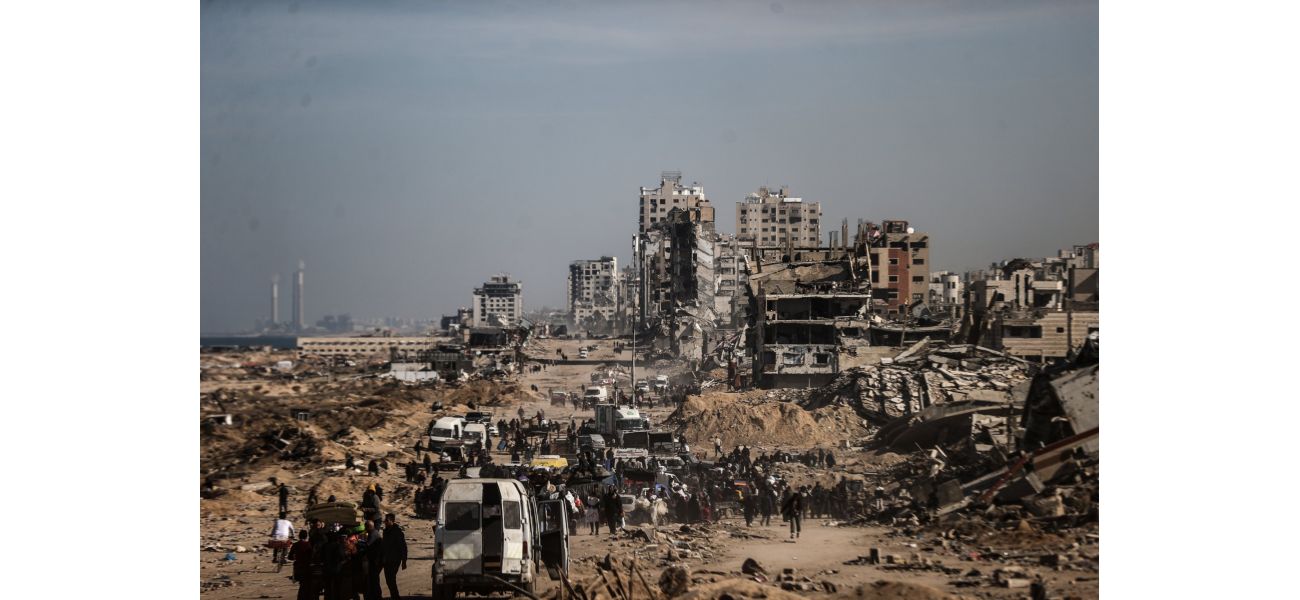The President may use aggressive behavior towards Jordan and Egypt to push through his Gaza proposal.
February 5th 2025.

After a ceasefire agreement between Israel and Hamas, Palestinians have started to return to their homes. However, amidst this fragile peace, a new development has caused quite a stir in the region. President Donald Trump has announced his controversial plan to "ethnically cleanse" Palestinians from Gaza and build a "Riviera of the Middle East". This has been met with strong criticism and described as a "recipe for chaos" by experts in an already destabilised region.
Even Israeli prime minister Benjamin Netanyahu seemed taken aback by the bold proposal, before eventually expressing his delight. As the US president shared his plans with reporters at the White House, a journalist can be heard in the background exclaiming, "It's their home, sir!" The backlash against this plan has been fierce, particularly in the Middle East.
This is not the first time in recent days that Trump has made such an outrageous suggestion, rethinking the future of an independent Palestinian state. Displaced Palestinians in the north in the Nuseirat area on al-Rashid Street are now left wondering about the potential consequences of this plan. Will it lead to an all-out war in the region? Where would Palestinians be resettled? And most importantly, does this plan put the ceasefire in Gaza in danger?
To get a better understanding of the situation, we spoke with Middle East experts Hugh Lovatt and Baraa Shaiban. When asked about the key takeaways from Trump's Gaza plan, they both agreed that it was a bold move by the US president. Trump declared that the US should take control of Gaza and permanently remove Palestinians, offering them resettlement in Egypt and Jordan instead. He even went so far as to envision a "Riviera of the Middle East" with endless job opportunities and housing for international communities.
However, the experts also pointed out that this plan is unlikely to be implemented, as it faces strong opposition from both Jordan and Egypt. These countries would have to deal with the potential implications of such a large influx of people, which would put a strain on their already fragile economies. Lovatt also raised concerns about how the US could take over Gaza without explaining the authority or means to do so.
Shaiban highlighted the pressure that Arab nations are already under from their citizens to oppose the war in Gaza more strongly. He also noted that no matter how much pressure Trump tries to impose on Egypt and Jordan, they would not agree to his plan. Lovatt added that this could lead to further tensions in the region and destabilize it.
The Middle East nations have already responded with condemnation and rejection of Trump's plan. Both Egypt and Jordan have made it clear that they will not take in 1.8 million Palestinian refugees. Saudi Arabia has also rejected the idea and reiterated their stance on not normalizing relations with Israel without a Palestinian state, which is a key goal of the Trump administration. Additionally, this plan could undermine the ceasefire in Gaza and the release of hostages.
When asked about the possibility of a wider war in the region, Shaiban does not see it as a likely outcome. He believes that neither Jordan nor Egypt would attack Israel over this plan, as they do not have the military strength to do so. However, the tensions caused by this proposal could push Hamas to come to the forefront again, ultimately causing more instability in the region.
Even Israeli prime minister Benjamin Netanyahu seemed taken aback by the bold proposal, before eventually expressing his delight. As the US president shared his plans with reporters at the White House, a journalist can be heard in the background exclaiming, "It's their home, sir!" The backlash against this plan has been fierce, particularly in the Middle East.
This is not the first time in recent days that Trump has made such an outrageous suggestion, rethinking the future of an independent Palestinian state. Displaced Palestinians in the north in the Nuseirat area on al-Rashid Street are now left wondering about the potential consequences of this plan. Will it lead to an all-out war in the region? Where would Palestinians be resettled? And most importantly, does this plan put the ceasefire in Gaza in danger?
To get a better understanding of the situation, we spoke with Middle East experts Hugh Lovatt and Baraa Shaiban. When asked about the key takeaways from Trump's Gaza plan, they both agreed that it was a bold move by the US president. Trump declared that the US should take control of Gaza and permanently remove Palestinians, offering them resettlement in Egypt and Jordan instead. He even went so far as to envision a "Riviera of the Middle East" with endless job opportunities and housing for international communities.
However, the experts also pointed out that this plan is unlikely to be implemented, as it faces strong opposition from both Jordan and Egypt. These countries would have to deal with the potential implications of such a large influx of people, which would put a strain on their already fragile economies. Lovatt also raised concerns about how the US could take over Gaza without explaining the authority or means to do so.
Shaiban highlighted the pressure that Arab nations are already under from their citizens to oppose the war in Gaza more strongly. He also noted that no matter how much pressure Trump tries to impose on Egypt and Jordan, they would not agree to his plan. Lovatt added that this could lead to further tensions in the region and destabilize it.
The Middle East nations have already responded with condemnation and rejection of Trump's plan. Both Egypt and Jordan have made it clear that they will not take in 1.8 million Palestinian refugees. Saudi Arabia has also rejected the idea and reiterated their stance on not normalizing relations with Israel without a Palestinian state, which is a key goal of the Trump administration. Additionally, this plan could undermine the ceasefire in Gaza and the release of hostages.
When asked about the possibility of a wider war in the region, Shaiban does not see it as a likely outcome. He believes that neither Jordan nor Egypt would attack Israel over this plan, as they do not have the military strength to do so. However, the tensions caused by this proposal could push Hamas to come to the forefront again, ultimately causing more instability in the region.
[This article has been trending online recently and has been generated with AI. Your feed is customized.]
[Generative AI is experimental.]
0
0
Submit Comment





